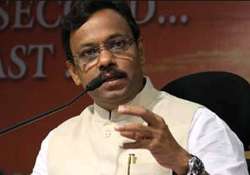Idea to include United Maharashtra agitation in books opposed
Nagpur: Maharashtra Education minister Vinod Tawde's attempt to include the ‘Samyukta Maharashtra' agitation in school history textbooks has been vehemently opposed by pro-Vidarbha leaders here who described the proposal as not only “anti-Vidarbha” but also

Nagpur: Maharashtra Education minister Vinod Tawde's attempt to include the ‘Samyukta Maharashtra' agitation in school history textbooks has been vehemently opposed by pro-Vidarbha leaders here who described the proposal as not only “anti-Vidarbha” but also an unsuccessful bid to supress the demand for creation of a separate state. Tawade's idea has met reservations by pro-separate state organizations as well as academicians and historians. Vidarbha Connect, a social forum seeking statehood for Vidarbha, has opposed the move, while others said that any mention of united Maharashtra agitation without that of separate Vidarbha movement would amount to distorting history.
Tawde, at a public function recently, had come out with the unique idea of the need to include in history texts the united Maharashtra agitation that was started in 1956 to demand creation of a separate Marathi speaking state by splitting the then bilingual Bombay Province. The agitation, that was mainly led by Pune, Mumbai based personalities like Keshavrao Jedhe, S M Joshi, Acharya Atre, Pabhodankar Thackeray, mainly targeted the then Chief Minister of Mumbai Morarji Desai who was keen on marinating the status of Mumbai.
At the same time, a Maha Gujarat agitation was also demanding a Gujarati-people state and even wanted Mumbai to be its capital.
Vidarbha Connect President Mukesh Samarth said that his organization was not per se against inclusion of the united Maharashtra agitation in school text books. “We only want it to be correct on facts. It is well-known that people of Vidarbha had nothing to do with the Samyutka Maharashtra agitation which had the sole purpose of retaining Mumbai in Maharashtra,” said Samarth. “It will be akin to rubbing salt on the wounds of the people of Vidarbha. It is equally true that a separate Vidarbha state agitation was also started at the same time and had popular support. The facts about their agitation were not mentioned.
So our only contention is that any chapter written on Samyukta Maharashtra should also mention the Vidarbha aspect and how a genuine demand of the people was crushed in the name of political contingency by former PM Jawaharlal Nehru. The PM then wanted to retain control over Bombay by forcing Marathi speaking Vidarbha region to merge into Maharashtra despite vociferous protests,” claimed Samarth. The pro-Vidarbha movement tapered off after the demise of stalwarts like Bapuji Aney but then it has its own significance, he said.
Ironically, political parties like Shiv Sena now oppose division of Maharashtra citing ‘martyrdom' of 105 persons who lost their lives in the united Maharashtra agitation from 1956 till January 1960 incident of Flora Fountain in which police opened fire on protesters in Mumbai.